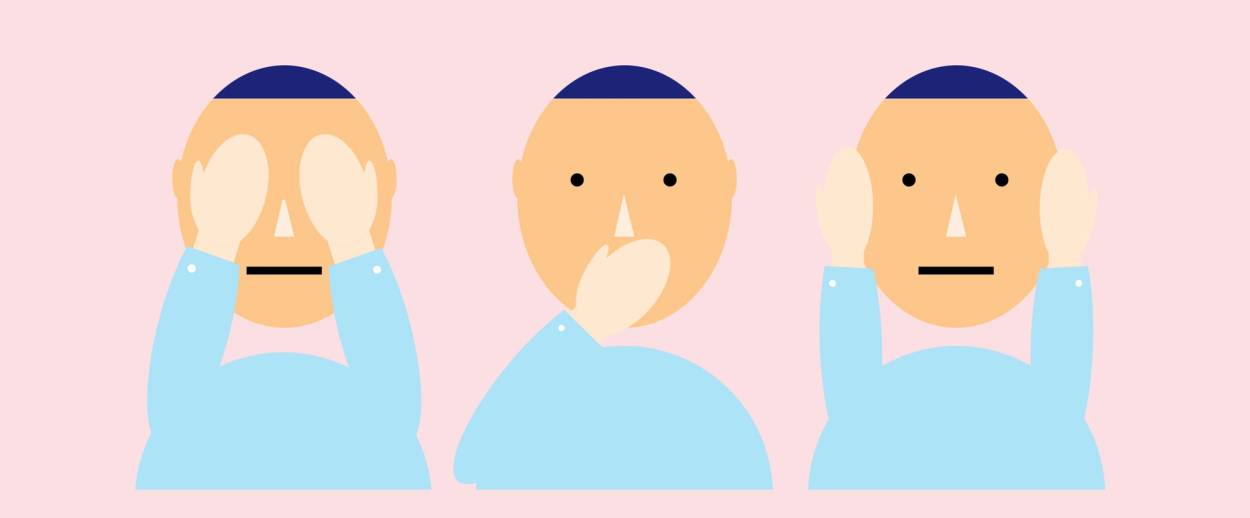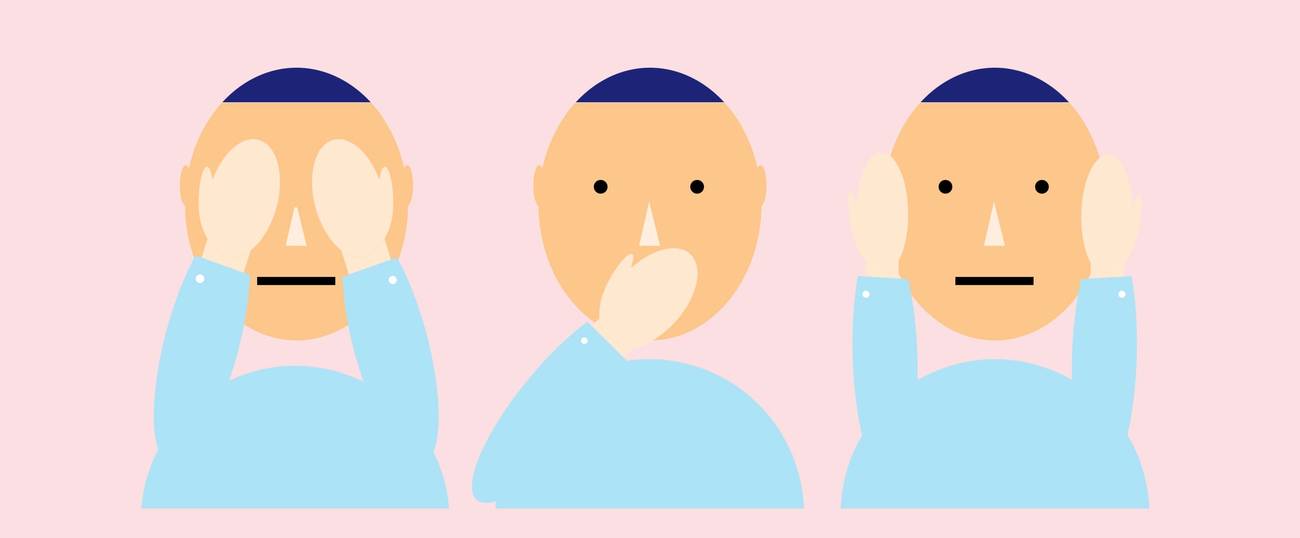The Closing of the American Jewish Mind
A shul reconsiders an invitation to give a talk on politics, based on a perception of the speaker’s political affiliations—and healthy dialogue takes yet another blow




From the earliest years of my childhood, I always learned that the Jewish community valued intellectual debate. I witnessed this at every stage of my Jewish education. I grew up as the son and grandson of Conservative rabbis, attending services every week where the congregants and leaders engaged in vigorous discussions about the meaning of the liturgy. I studied at the Solomon Schechter Day School where my favorite class was Talmud, where our teacher Rabbi Lerner would carefully walk us through each line of text and demonstrate how every word and sentence could be dissected for new meaning. Rabbi Lerner taught us that the Talmud showed us how the Jewish people believed in debate for debate’s sake rather than trying to make everyone conform to the same opinion. That is the essence of Judaism. At Camp Ramah, we spent the time in between sports and socializing learning about how part of our role as maturing Jewish teenagers was to engage with and proactively unpack everything that we learned about services and our history. I even remember on my many trips to Israel, watching citizens stand on the street in robust arguments about left-right politics, only to conclude by sitting down over food, drinks, and friendship.
This was also what the holidays were all about. The Pesach Seder has always been a favorite holiday of the year, a magical pair of evenings when families and friends gather around the dinner table to spend hours debating the meaning of our history and the rituals that we repeat each year.
Ask a group of Jews their opinion about something, and each one will give you a different answer. “Two Jews, three opinions,” so the joke goes. Most would agree that this spirit of contentiousness has not been a source of weakness but, rather, a source of spiritual and ethnic vitality.
This is why I was so troubled about a recent incident that I experienced when the president of a shul in Pennsylvania invited me to speak there. As a professor of History and Public Affairs at Princeton University and a columnist at CNN, I often give talks about politics, usually trying to put contemporary issues in historical perspective. I offered him to give a talk about my recent book on Lyndon Johnson and the Great Society or about the election of 2016 in broader perspective, or about American Jews and the Civil Rights movement in the 1960s. We agreed on a few dates and a fee. Everything seemed to be in place, and I was happy that we could make things work.
What I didn’t expect was to receive an email from him a few weeks later. The president wrote back, admitting that he was embarrassed, to inform me that when he brought this to the shul committee concern unexpectedly arose. Trying to justify what he was about to tell me, he joked: “Because we are a synagogue … we have to be arguing about you coming to speak. The argument goes something like this … ”
Then he got to the point. Some people in the meeting, he explained, said that since “he appears on MSNBC and CNN, he is clearly J Street,” referring to the liberal Jewish organization, an alternative to AIPAC, that has come under fire for its positions on how to pressure Israel into a two-state solution. He explained that he assured his friends that I was a terrific speaker and a respected scholar. But accepting their terms of debate, he meekly concluded the email by asking: “And please confirm that you aren’t a dues-paying member of J Street.” He didn’t agree with what they were saying, he wrote, but he still asked.
It was difficult to digest the email. Besides the debate that I had seen, including at my shul in Princeton, about whether J Street should be able to rent out synagogue space for their events, this went a level further. Even though my talk would have nothing to do with Israel, they were implying guilt by association. Just because I had appeared on certain networks (they didn’t seem to be aware of my appearances on FOX news), I must be a member of this organization. They even wanted to confirm whether or not I belonged. I couldn’t resist writing to him that Israel was not really the kind of issue I study or discuss, though McCarthyism in the 1950s is. I also told him quite directly that I am not a member of J Street even though it really wasn’t relevant. But my response didn’t seem to matter. In the end, the shul committee decided that I would be “political and divisive” so it would not go through with having me as their speaker. “Alas, synagogue politics have won out,” he wrote. I could only imagine my grandfather, who was a founder of the Conservative Jewish community in Ohio and someone who taught me the centrality of debate as we watched Crossfire together in his home office, shaking his head in frustration.
This exchange deeply saddened me, reflecting the diminished state of the Jewish community. We no longer seek debate, nor do many shuls even allow it to happen. We are having trouble being tolerant of the other side. Rather than having different sides of the Jewish community debate the issue of U.S.-Israeli relations, too many shuls around the country are moving in the direction of simply prohibiting one side or the other from having a voice. As this exchange indicated to me, some shuls are now reaching the inevitable next step of slandering the character of fellow Jews simply through their possible associations.
We no longer seek debate, nor do many shuls even allow it to happen.
While members of J Street have often been the focus of these controversies in recent years, everyone should realize that this kind of environment will impact other constituencies down the line. Once this becomes an acceptable part of the body politic, every perspective is at risk at some point in the future. Jews, more than almost any other social group, should know that.
These styles of arguments are creating a toxic environment within the Jewish community. The situation deteriorated so badly here at Princeton that the shul called in a professional mediator, Rabbi Melissa Weintraub, who directs the Jewish Council for Public Affairs (an umbrella organization of grassroots Jewish organizations created in 1994) Civility Campaign, a group that is devoted to promoting “mutual respect, shared listening, learning, and problem solving,” to spend hours with congregants trying to simply teach them how to communicate with one another in civil fashion. Since 2010, Weintraub has been working hard to break through the discordant environment that has taken hold. “A community’s destiny does not rise and fall based on how it handles its times of harmony and consensus,” she wrote, “but on how it responds to its moments of greatest discord and disagreement.” In Princeton, the rabbi used rudimentary ice-breaker activities, the kind used in schools, to help people talk. When a friend described what happened at these sessions, I couldn’t help but think about how far we have fallen. Weintraub’s efforts are important and honorable, but the situations that she deals with are not sustainable.
The vitriol makes it less likely that Israel will be a topic of discussion among American Jews in our communal institutions. Not only does this politicization undermine our ability to interact as a true community, rather than as an institution of factions, but it actually stifles the possibility for congregations to talk about and think about and to enjoy the central role of Israel in our collective experience. The executive vice president of the Academy for Jewish Religion told the Times of Israel that many rabbis were reporting being “unable or not comfortable talking about Israel in their synagogues. It didn’t come from a lack of love. They’re deeply invested in Israel, and yet they felt they could not get into a conversation without deeply offending other parts of their community.”
We can’t let this continue. When Rabbi Steve Gutow, who hired Weintraub in his capacity as the head of the Jewish Council for Public Affairs, stepped down from his position last May, he lamented: “It’s become much worse. I see people say anything, and they don’t listen to your side.”
The issue is not simply moral but practical as well. At a time when Jewish institutions are struggling to retain and attract members, closing the doors to discussion will only dissuade those who are not already invested in our community to join.
The American Jewish Community—all sides from J Street to AIPAC supporters—need to remember what I was taught in Rabbi Lerner’s Talmud class in Cranford, New Jersey. As my family will soon head over to visit Israel, I hope that we can come back to a community willing to allow all sides—left, right, and center—to be part of our discussions about these two nations. Only through robust debates can we better understand the path toward the best decisions. Only through interaction and open dialogue can we be human and tolerant of divergent views. Only through real dialogue can we be a healthy community. The current environment will not allow this to happen.
***
You can help support Tablet’s unique brand of Jewish journalism. Click here to donate today.
Julian E. Zelizer is a political historian at Princeton University. He is finishing a biography of Abraham Joshua Heschel that will be published by Yale University Press as part of the Jewish Lives Series. In July, Penguin Press will publish Burning Down the House: Newt Gingrich, the Fall of a Speaker, and the Rise of the New Republican Party.